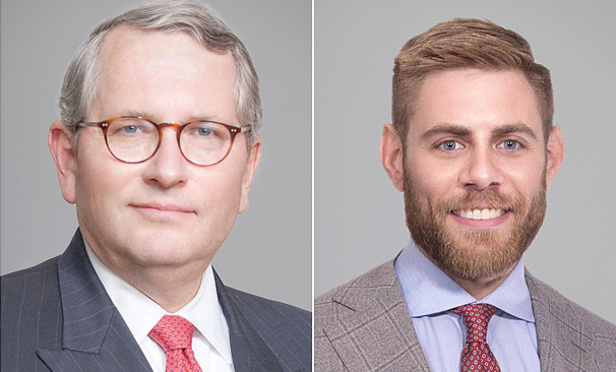Carl W Hittinger

March 02, 2018 | The Legal Intelligencer
Should a Judge's Personal Judicial Experience Affect Antitrust Pleadings?When the Supreme Court scrapped Conley v. Gibson's “no set of facts” federal pleading standard in Twombly (2007) and Iqbal (2009), courts initially struggled to apply the inherently ambiguous “plausibility” standard. In the immediate aftermath, some courts frankly misconstrued Twombly and Iqbal to invite a Daubert-style “gate keeper” appraisal of complaints in which judges could (and should) prune claims that, based on their own personal experience with the subject matter at issue, appeared dubious.
By Carl W. Hittinger and Tyson Y. Herrold
10 minute read

February 05, 2018 | The Legal Intelligencer
No Health Care Merger Too Small for the FTC to Take an Antitrust LookIn our November and December 2016 articles, we discussed the Federal Trade Commission's proclivity to challenge health care mergers, even when the purported anticompetitive effects of the relatively economically limited merger would be confined to a local geographic region.
By Carl W. Hittinger and Tyson Y. Herrold
8 minute read

December 01, 2017 | The Legal Intelligencer
New Antitrust Division Chief Prioritizes Regulation of Standard Setting OrganizationsAs we discussed in our May 2017 article, the current head of the DOJ's Antitrust Division, Makan Delrahim, brings considerable intellectual property experience to the division. Delrahim started his legal career at the Office of the U.S. Trade Representative as deputy director for intellectual property rights.
By Carl W. Hittinger and Tyson Y. Herrold
8 minute read

November 06, 2017 | The Legal Intelligencer
Supreme Court to Decide First Antitrust Case in Two YearsOn Oct. 16, 2017, the Supreme Court granted certiorari in United States v. American Express Company, the Court's first antitrust case of the 2017 term and the first antitrust case they have reviewed since 2015.
By Carl W. Hittinger and Tyson Y. Herrold
24 minute read

September 29, 2017 | The Legal Intelligencer
Presidential Power and Antitrust Politics: Part ThreeIn July and August, we discussed the president's role in setting antitrust policy at the Department of Justice, Antitrust Division. Specifically, we pointed out that presidents routinely face competing domestic and foreign policy challenges that require a delicate balance and flexible approach to antitrust enforcement.
By Carl W. Hittinger and Tyson Y. Herrold
9 minute read

August 25, 2017 | The Legal Intelligencer
Presidential Power and Antitrust Politics: Part TwoLast month we discussed the role of the presidency in formulating antitrust policy, pointing out the fallacy of the view that the Antitrust Division of the Department of Justice has historically been (or should be) completely independent of the White House. We posited that history shows that the Antitrust Division's enforcement decisions have been (and should be) a product of informed presidential policy and that past presidents have attempted to apply the Sherman Act in a way that balances the panoply of challenges, both foreign and domestic, that every president elected by the people invariably faces.
By Carl W. Hittinger and Tyson Y. Herrold
20 minute read

July 28, 2017 | The Legal Intelligencer
Presidential Powers and Antitrust Politics: Part OneIn June, we discussed the Trump administration's candidate for the top post in the Department of Justice's Antitrust Division: Makan Delrahim. During Delrahim's confirmation hearing, Sen. Amy Klobuchar pressed him, "What would you do, if you're in this job, if the president, or the vice president, or a White House staffer calls, and wants to discuss a pending investigation of an antitrust matter?" Delrahim responded, "The role of the assistant attorney general for antitrust is a law enforcement function," and that "politics will have no role in the enforcement of the antitrust laws." Delrahim's comment appeared to placate Klobuchar's present concerns about White House intercession or interference in pending antitrust investigations, although a confirmation vote by the full Senate is still pending. However, viewed historically, the constitutional role of the executive branch and the president in particular in dictating, directing and controlling antitrust enforcement policy is far more complex and nuanced. As is often the case, history provides the necessary context to answer thorny constitutional questions.
By Carl W. Hittinger and Tyson Y. Herrold
9 minute read

June 02, 2017 | The Legal Intelligencer
DOJ's Possible Antitrust Chief's Senate Confirmation HearingLast month, we discussed Makan Delrahim's background, including his experience litigating antitrust and intellectual property matters at the Department of Justice during the George W. Bush administration and his extensive lobbying work at Brownstein, Hyatt, Farber and Schreck. On May 10, senators from the Senate Judiciary Committee held a hearing and asked Delrahim about several matters that pose potential challenges should he be confirmed as assistant U.S. attorney of the Antitrust Division of the DOJ. For the most part, Delrahim provided candid answers, at one point even offering, "I'm an open book on this issue." Three discussions were particularly insightful.
By Carl W. Hittinger and Tyson Y. Herrold
19 minute read

May 01, 2017 | The Legal Intelligencer
Trump's Pick for Department of Justice Antitrust Division ChiefLast month we discussed Supreme Court Justice Neil Gorsuch's confirmation hearings. Specifically, we noted the Senate Judiciary Committee's failure to nail Gorsuch down on key antitrust issues, including issues he handled as an experienced antitrust lawyer and decided as a judge on the U.S. Court of Appeals for the Tenth Circuit, which we also wrote about.
By Carl W. Hittinger And Tyson Y. Herrold
20 minute read

March 31, 2017 | The Legal Intelligencer
The Senate's Uneventful Gorsuch Confirmation HearingRecently, we discussed in prior articles the antitrust legacy of Neil Gorsuch, currently a judge on the U.S. Court of Appeals for the Tenth Circuit and nominee for the Supreme Court of the United States. Gorsuch has significant antitrust experience, both in private practice and on the bench. While at Kellogg, Huber, Hansen, Todd, Evans & Figel, Gorsuch defended "Baby Bell" SBC Communications, a company formed after the Federal Trade Commission's breakup of AT&T, and prosecuted (to a jury verdict) what is widely considered to be one of the largest private antitrust awards in Conwood v. United States Tobacco. As a judge on the Tenth Circuit, Gorsuch has written several high-profile antitrust opinions, among them Novell v. Microsoft, a case in which the Tenth Circuit concluded Microsoft had no duty under the Sherman Antitrust Act to share its intellectual property with rival software-developer Novell. Indeed, during Gorsuch's four-day Senate confirmation hearing last week, Democratic Sen. Amy Klobuchar called Gorsuch as an antitrust expert.
By Carl w. Hittinger and Tyson Y. Herrold
19 minute read
Trending Stories
- 1Gibson Dunn Sued By Crypto Client After Lateral Hire Causes Conflict of Interest
- 2Trump's Solicitor General Expected to 'Flip' Prelogar's Positions at Supreme Court
- 3Pharmacy Lawyers See Promise in NY Regulator's Curbs on PBM Industry
- 4Outgoing USPTO Director Kathi Vidal: ‘We All Want the Country to Be in a Better Place’
- 5Supreme Court Will Review Constitutionality Of FCC's Universal Service Fund
More from ALM
- Legal Speak at General Counsel Conference East 2024: Match Group's Katie Dugan & Herrick's Carol Goodman 1 minute read
- Legal Speak at General Counsel Conference East 2024: Eric Wall, Executive VP, Syllo 1 minute read
- Legal Speak at General Counsel Conference East 2024: Virginia Griffith, Director of Business Development at OutsideGC 1 minute read



